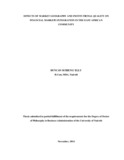| dc.description.abstract | The East African Community (EAC) is in the phase of transition from a common market to a monetary union characterized by a single currency. This phase requires integration of financial markets. Studies on financial markets integration in EAC concur on none deepening of integration evidenced by divergences in the financial market segments. Considering that divergences in market returns are not the desirable outcome of the process, this study sought to establish any effects of market geography and institutional quality on integration of financial markets in the EAC. Specifically, the study sought to: Establish integration relationships between Kenyan and other EAC financial market segments; determine the relationship between market geography and financial markets segments integration; investigate the influence of institutional quality proxied by rule of law and political stability on the relationship between market geography and financial markets segments integration and Probe the Joint effects of market geography and institutional quality attributes on integration of financial markets segments. Structured as a longitudinal study on three equity, five Treasury bill and five interbank markets, the study applied monthly market return and market geographical data for a 14 year period (2000 to 2013) to test five hypotheses. The main study findings revealed that there are linkages in the money markets and long run integrating relationships amongst the equity markets though perfect and full integration has not been attained. The study establishes that GDP, remoteness, financial sector deepening policy (Fsd) and adjacency are statistically significant geographical variables in explaining financial markets segments integration. Institutional quality as a factor in financial markets integration is confirmed when political stability moderates the influence of geography on integration and rule of law mediates the same relationships. Given that measures of remoteness and financial deepening policy are related to GDP and distance, the study recommends formulation of policies that promote EAC member country macroeconomic convergence and market efficiency which are supportive of financial markets integration and subsequently, economic integration. | en_US |

